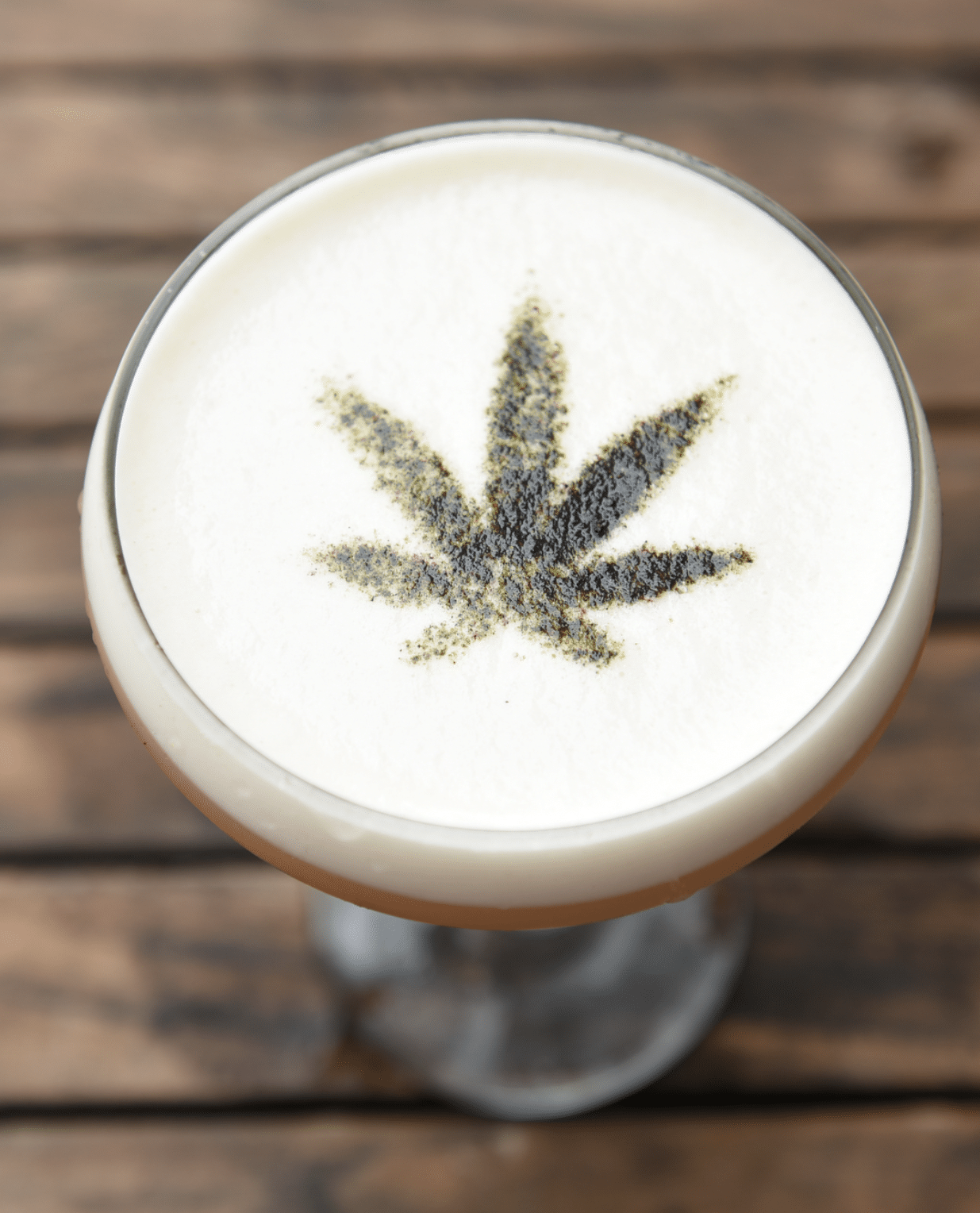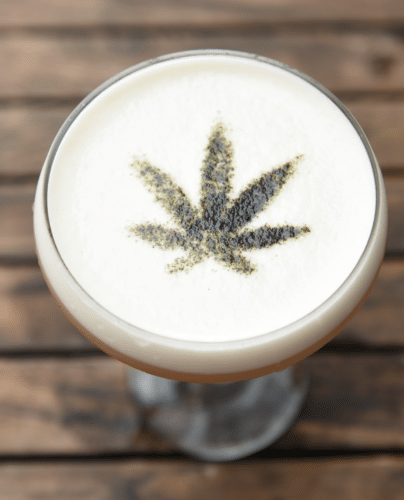Keep calm, Hoboken and Jersey City — this is not a drill {and soon staying calm will be pretty easy to do}. Marijuana legalization looks like it’s happening VERY soon in New Jersey.
The latest development in the ongoing effort to legalize recreational marijuana statewide comes in the form of a deal. That’s right — Governor Phil Murphy, Senate President Steve Sweeney, Assembly Speaker Craig Coughlin, and Senator Nicholas Scutari have struck a deal. The agreement seeks to legalize adult-use marijuana in the state of New Jersey, while also expunging marijuana offenses that already exist. Read on to find out all about this potential marijuana legalization in the Garden State.

{Photo: @NorthernSoulHoboken}
Don’t break out the bong just yet; lawmakers say a vote won’t be held until Monday, March 25th. It’s expected that Governor Murphy will support the bill and sign it into law before April.
“The prohibition on marijuana has long been a failed policy,” said Senator Scutari. “This plan will bring an end to the adverse effects our outdated drug laws have had on the residents of our state. As a regulated product, legalized marijuana will be safe and controlled. It is time to legalize adult use marijuana in New Jersey and this is a well-crafted legal reform that will advance social policy in a fair and effective way.”
The Fine Print
While it seems that Hoboken and Jersey City residents could very soon be smoking legal recreational reefer, there’s still a whole regulatory process that needs to be sorted out.
First things first, legal recreational weed isn’t expected to hit stores until at least six months after Murphy signs the bill. However, it could take up to a year before you start seeing ganja on the bodega shelf.
Hoboken Girl has been following the marijuana legalization story for some time now. Back in July 2018, we reported that Jersey City was adapting laxer regulations in regards to the recreational drug. On July 20th, JC Mayor Steven Fulop and chief municipal prosecutor Jake Hudnut instituted a policy that amended five cannabis-related offenses. This included possession, possession in a motor vehicle, being under the influence, use or possession with the intent to use drug paraphernalia, and loitering to obtain or distribute a controlled dangerous substance.
“What gives me pause is that despite the similar cross-racial usage of marijuana, New Jerseyans of color are three times more likely to be arrested and prosecuted for marijuana than white New Jerseyans,” chief municipal prosecutor Hudnut said at the time. “I think prosecutors have an obligation to acknowledge this and fix this problem.”
Mayor Fulop shared a similar sentiment.
“It’s probably the first time the city has had a prosecutor that has been really proactive thinking about policies and how they really impact the entire city,” Fulop said.
But even though other cities have made efforts to decriminalize marijuana — Philadelphia and New York City to name a few local ones — not all city representatives have been on board with the process.
“As a municipal prosecutor, you do not have the legal authority to decriminalize marijuana or otherwise refuse to criminally prosecute all marijuana-related offenses in the municipal courts of Jersey City,” State Attorney General Gurbir Grewal said in a July 20th, 2018 letter to prosecutor Hudnut.
At the time, Grewal continued to state that Fulop and Hudnut’s policy was void because it “violates state criminal laws.”

That’s one of the reasons this statewide legislation is so significant. Once Murphy signs the bill into law, New Jersey cities can begin making their own local legislation regarding the selling of legal recreational marijuana. In fact, it’s a crucial part of equalizing racial disparities.
“Legalizing adult-use marijuana is a monumental step to reducing disparities in our criminal justice system,” Governor Murphy said of the deal. “I believe that this legislation will establish an industry that brings fairness and economic opportunity to all of our communities, while promoting public safety by ensuring a safe product and allowing law enforcement to focus their resources on serious crimes.”
You might be wondering how the legalization of recreational marijuana is expected to reduce racial disparities. First, legalizing the drug will crack down on a lot of current and previous resources that were once used to incarcerate and charge people for marijuana-related offenses.
But there’s even more to it. Besides keeping people out of jail, the current legalization plan contains several provisions that strive to highlight and empower women, minorities, people of low- and middle-incomes, and other disadvantaged communities by giving all opportunities to participate in the industry.
“This plan will allow for the adult use of cannabis in a responsible way,” said Senate President Sweeney. “It will create a strictly regulated system that permits adults to purchase limited amounts of marijuana for personal use. It will bring marijuana out of the underground market so that it can be controlled, regulated and taxed, just as alcohol has been since the end of Prohibition. This plan will also advance important social justice reforms to help reverse the discriminatory impact that drug laws have had on diverse communities.”
New Jersey will hardly be the first state in the U.S. to decriminalize and legalize recreational marijuana. The District of Columbia plus ten other U.S. states have already done so in recent years. In 2012, Washington and Colorado became the first states to adopt recreational use. Since then, Alaska, California, Maine, Massachusetts, Oregon, Nevada, Michigan, and Vermont have followed suit — Michigan being the first state to legalize recreational marijuana through the legislative process rather than by ballot measure.
Vermont’s laws allow for adults over the age of 21 to grow small amounts of cannabis at their homes, but do not allow for decriminalized retail sales.
“The agreement reached to legalize adult-use cannabis is the result of incredibly hard work by many people over many months,” said Assembly Speaker Coughlin. “Getting to this point wasn’t easy. We talked and we negotiated in good faith, but most importantly, we listened. I want to thank Governor Murphy and Senate President Sweeney for their tireless efforts and willingness to compromise so we could put forth the most responsible legislation possible. I believe this new, regulated industry will help boost our economy, but I’m particularly proud of the critical social justice components included in the bill.”
Marijuana + Hoboken
As for the Mile Square, the legalization of recreational marijuana could mean a number of things, however, how that legislation will directly affect Hoboken is still to be determined. Hoboken Girl spoke with Mayor Ravi Bhalla to get his take on what legalization would mean for the City. Here’s what he had to say:
Hoboken Girl: Do you support the legalization of marijuana?
Ravi Bhalla: The legalization of cannabis is an important issue, both socially and economically. This is a social justice issue. While people of all races use cannabis recreationally at about the same rates, people of color are disproportionately more likely to be arrested. Additionally, cannabis has a number of medicinal benefits that would have positive effects on the lives of residents. Beyond that, this could be a big boon for the local economy. Given the massive impact of legalization, we want to make sure that any legislation that is passed allows for municipalities to have proper oversight over the industry.
HG: How will this look in Hoboken {i.e. specific legislation, allowances, etc}?
RB: We have already passed a zoning ordinance in Hoboken that strictly maps out where cannabis facilities can open for business in Hoboken. Our plan is to keep any facilities out of a “residential” neighborhoods and focus it in the CBD and the industrial zone in the North. The ordinance passed by the City also regulates where dispensaries can be located are for medicinal use only, not adult use.
HG: Are you in support of medical dispensaries in Hoboken?
RB: I am absolutely in support of medical dispensaries. The medical benefits of cannabis are proven and real. Given our residents, the opportunity to fully access alternative methods of health care is paramount to our resident’s well being.
HG: We’ve heard talks of a cannabis improvement district. Anything you can elaborate on this front?
RB: Right now I am most focused on leveraging the legislation that is being discussed at the state level. It is critical that the state gives local municipalities the ability to not only have proper oversight over the industry but it the hope is that revenues can be reinvested into the communities. Investments in infrastructure, schools, and quality of life improvements are all beneficiaries of a flourishing cannabis industry and if a cannabis improvement district can help us get there, then I am supportive.
Have thoughts on New Jersey legalizing recreational marijuana? Sound off in the comments below!










